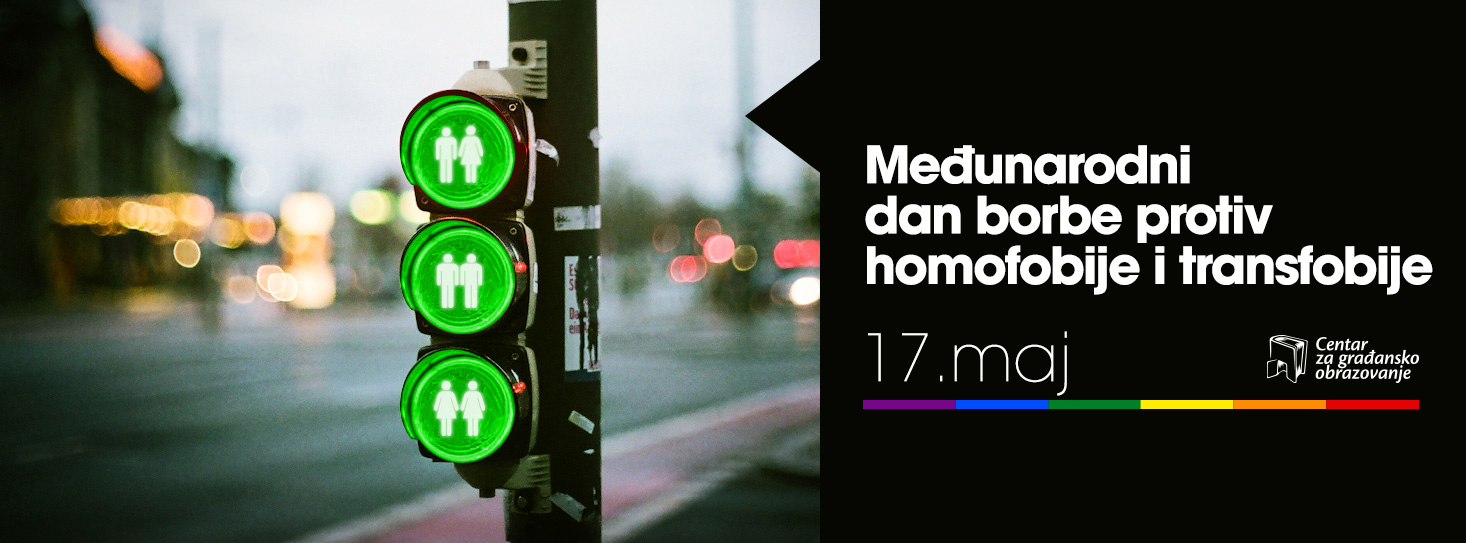Centre for Civic Education (CCE), on the occasion of 17 May – The International Day Against Homophobia, Transphobia and Biphobia, points out that Montenegrin society must undertake additional efforts in fight for human rights culture that recognize and accept each citizen as equal before the law and in society regardless of sexual and gender differences. Of course, in this case institutions have particular responsibility.
LGBTI persons in Montenegro, despite declarative prohibition of discrimination, do not yet have necessary support to enable them to enjoy all their rights and live lives without fear of having any unpleasant situation because of their different sexual orientation or gender identity. This year’s International Day Against Homophobia, Transphobia and Biphobia focuses on justice and protection for all, and UNDP also emphasizes the support for developing initiatives for putting an end on exclusion, discrimination and violence against LGBTI persons. To take care of this imperative is more than ever necessary, and in the line of this are the CCE’s efforts, which are currently enhanced within the project “NO to Discrimination, YES to Diversity”.

A public opinion survey conducted by the CCE, in February this year, in order to identify and position citizens’ attitudes towards LGBTI issue, indicates positive step forward that should be used to move position of LGBTI persons in Montenegro from declarative tolerance to full acceptance and respect. The data that 81% of respondents state that they would help LGBTI person in case of witnessing violence against him is encouragement for fight against discrimination and violence.
Also, when it comes to the very current Law on the life partnership of the same – sex partners, which will be soon voted by MPs, it should be noted that 55% of citizens have positive attitude towards the adoption of this law, which is a significant change compared to less than a fifth, i.e. 18% from 2016. This should also be an encouragement to those MPs who still calculate how much it brings or takes away from them in electorate instead of being leaders in promoting human rights culture.
Unfortunately, CCE’s survey has indicated that only slightly less than one-third of citizens would accept their child fully if they found out that his sexual orientation is different from heterosexual.
Therefore, in the last period, the CCE had a focus on working with high school students, in the schools itself, and directly enabled meetings of pupils with members of the LGBTI community and discussions with them on the prevention and suppression of violence against LGBTI people. Believing that the high school age is the most convenient for influencing attitudes on various issues, values and principles, but also their strengthening to fight for their rights and rights of those who cannot do that. Through 11 workshops, we had also opportunity to be familiarised about the attitudes of young people who surprised us positively, but also got concerned as some of them are still in chains of tradition, prejudices and stereotypes. Hence, it is necessary to continue fight for LGBTI rights, both at the social stage and in the Parliament and to adopt solid legal solutions that will create legal presumption for the equal life of LGBTI people in Montenegro.
The CCE today celebrates diversities that represent treasure for every society, and more than that – celebrates all lesbian, homosexual, trans, non-binary, intersexual and queer persons, activists and organizations for the protection of LGBTI rights, who, on their own example and experience, confronted discrimination in Montenegro. Today, and every day, we support them and the fight for human rights and dignified life of LGBTI persons.
The International Day Against Homophobia and Transphobia is marked worldwide every 17 May in order to raise awareness about LGBTI rights and to protect prohibition of violation against LGBTI rights. It represents a symbolic day of LGBTI persons, since on 17 May 1990, the World Health Organization (WHO) removed homosexuality from lists of mental disorders.
Zeljka Cetkovic, Programme Associate
